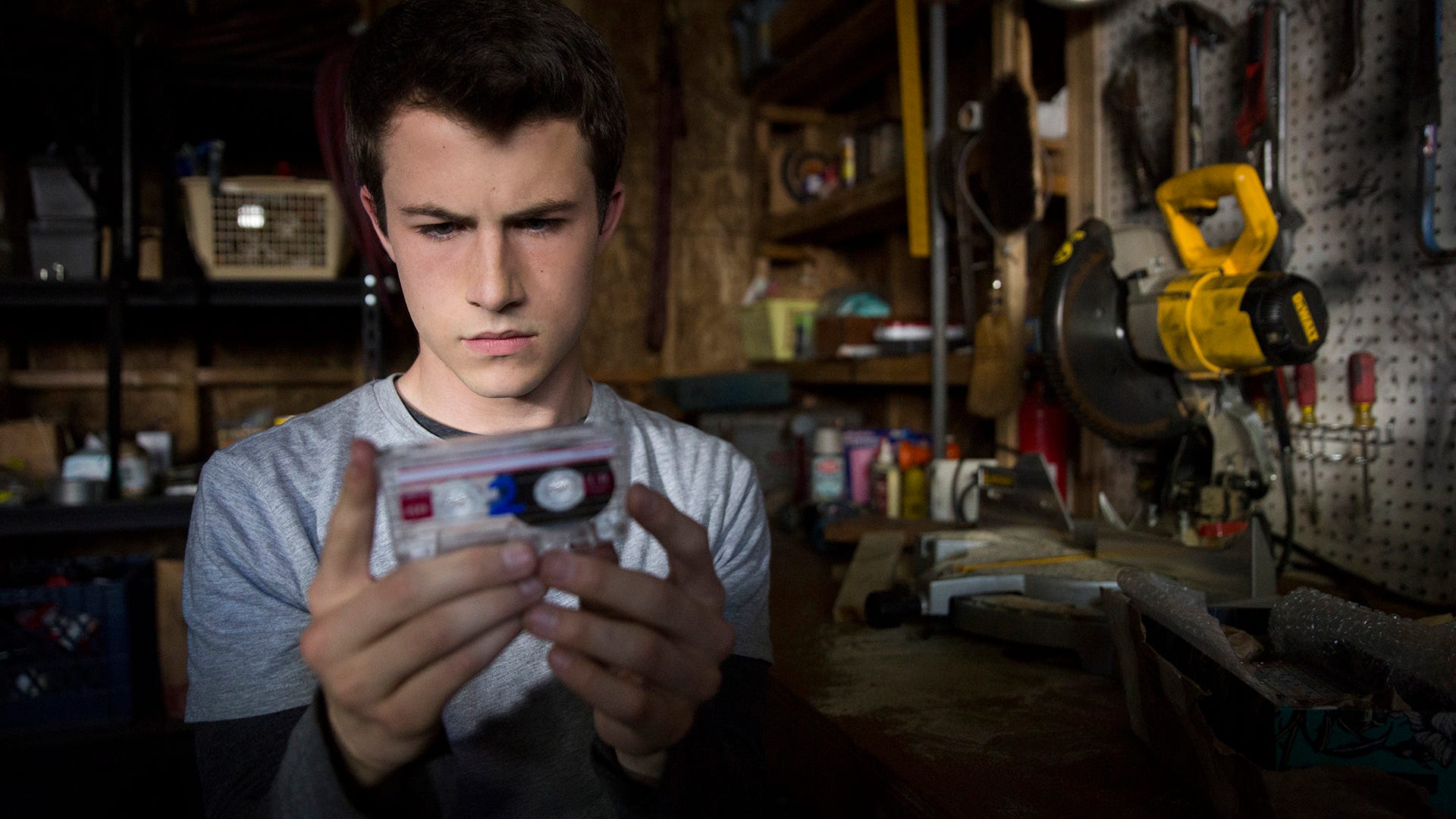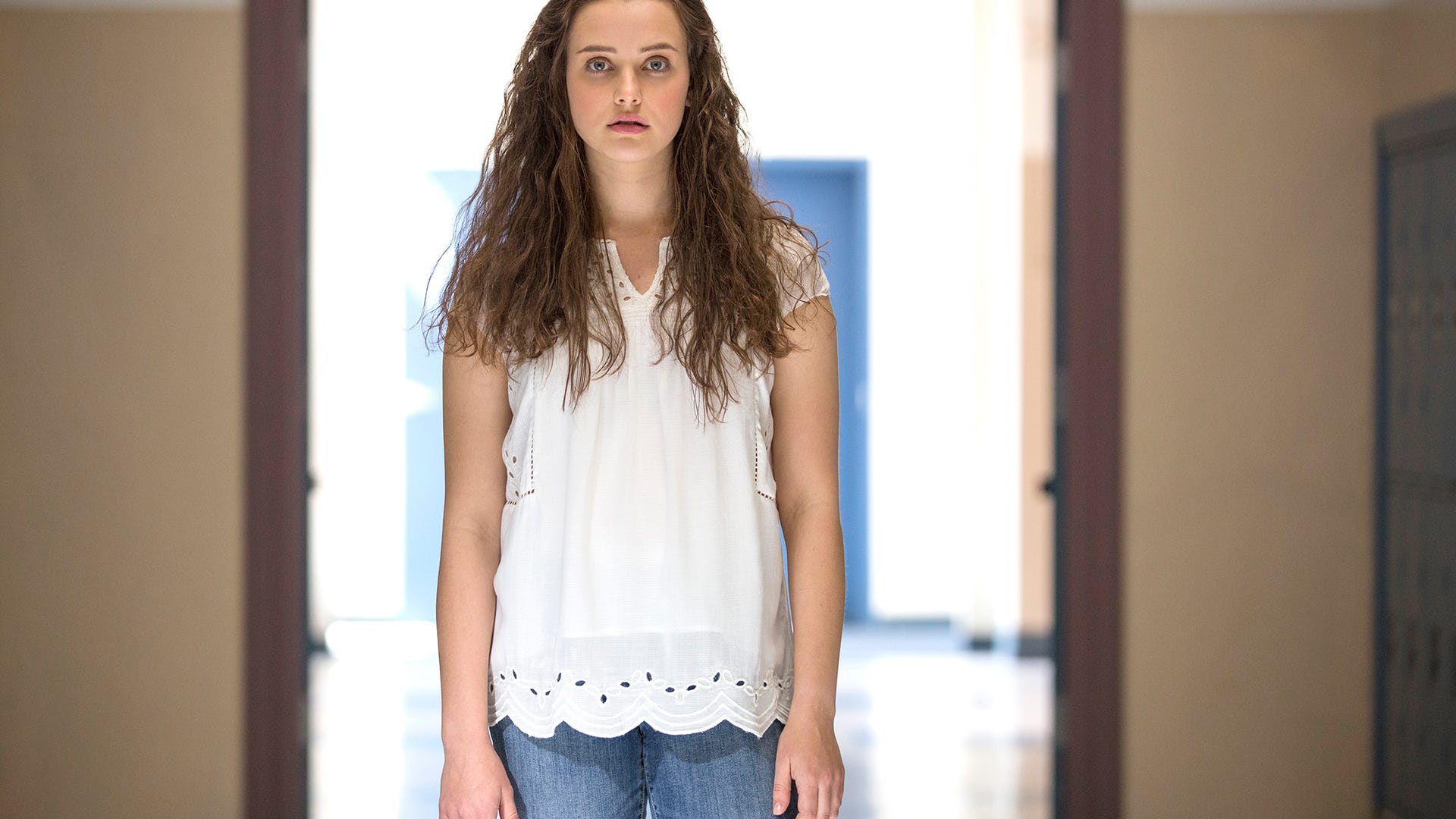Join or Sign In
Sign in to customize your TV listings
By joining TV Guide, you agree to our Terms of Use and acknowledge the data practices in our Privacy Policy.
Netflix's 13 Reasons Why Adaptation Isn't Perfect, But It Is Must-See TV
The drama is unlike anything else on TV
There was a time when shows about regular, everyday high schoolers were the bread and butter of young adult television. But now, unless you have a murder mystery to solve, a very special boyfriend (either a vampire, werewolf or an A-list movie star will do) or a dystopian future to survive, it's as though the inner lives of teens aren't important enough to take seriously on their own.
Netflix's new drama 13 Reasons Why is here to change that.
Based on Jay Asher's best-selling book and produced by Selena Gomez, the hook of 13 Reasons Why isn't anything sexy or supernatural. It tells the story of Hannah Baker (Katherine Langford), a high school junior who decided to take her own life and the 13 reasons that led her to that choice.
Before slitting her own wrists, Hannah recorded 13 cassette tapes, each one dedicated to a different person who contributed to her decision to commit suicide. After her death, Hannah has the box of tapes sent to the first person on her list with instructions to listen to all 13 before passing them on to the next person, lest a second copy of the tapes be made public, exposing everyone's secrets and misdeeds.
When the show picks up, the tapes have already worked their way through the majority of the list and have now reached Clay Jensen (Dylan Minnette), Hannah's do-gooder classmate who is understandably horrified to learn that he did anything to harm his long-time crush. As Clay listens to the tapes, the show beautifully weaves between Hannah's past and his present, spinning an intricate web that demonstrates how a few seemingly innocuous actions can lead to such tragedy -- tragedy that continues to snowball long past Hannah's death.

Unlike the book, which focused exclusively on Clay's experience listening to Hannah's tapes over the course of one night, Netflix's adaptation expands the story far beyond the lives of just Clay and Hannah, dedicating time to understanding and exploring the perspectives of everyone involved, from Hannah's grieving and confused parents (Kate Walsh and Brian d'Arcy James) to the fellow students whom she blames for her death (including Parenthood's Miles Heizer and breakout performances by Alisha Boe and Brandon Flynn).
One of the main messages of 13 Reasons Why is that you never know what someone else is experiencing, and the same rings true for the people named on Hannah's tapes. Just as Hannah made sure the tapes told her story, the show makes sure to give the same opportunity to the people on her list, attempting to expose the root cause that led them to become one of her 13 reasons. And while no one is beyond blame in this series, neither are they beyond sympathy.
13 Reasons Why takes the incidents Hannah describes in the tapes -- which range from naming her Best Ass in the high school to being complicit in a sexual assault -- and gives the accused an opportunity to have their own voice on the matter heard. Even the book's most spotless character, Clay, is revealed to have made some unintentional stumbles in his relationship with Hannah, forcing Clay to reassess how he's chosen to live his life. In many cases, understanding why one of her peers made such a selfish or outright cruel decision doesn't make their action any less abhorrent, but it does underscore the recurring theme that no one -- not even Hannah -- can truly know the full story of someone else's life.
Expanding the world of 13 Reasons Why beyond just Clay and Hannah works almost entirely to the show's benefit, but there are a few times when the show stumbles in its transformation into an ensemble drama. The focus placed on how individual tape recipients are coping with the accusations that they were to blame for Hannah's death is a fascinating study in grief, guilt and denial. But when nearly all the recipients before Clay ban together to form a makeshift gang determined to stop him from passing the tapes along any further (complete with threats to kill him if he doesn't fall in line), it sometimes verges beyond the realm of believability, which is otherwise one of 13 Reasons Why's greatest strengths.
13 Reasons Why: Watch the heart-wrenching trailer
Often after a suicide, the people left behind will feel a complex mix of anger, confusion and grief. And in many ways, 13 Reasons Why is a macabre form of wish fulfillment in that it provides all the answers to the question on everybody's mind: Why? By the end of the season's 13th and final episode, there will be no questioning why a young woman with such wit and potential decided to take her own life; the reasons behind her decision will be made excruciatingly clear. Where the show falters, however, is failing to properly explore the difference between understanding why Hannah would blame these people for her death and the validity of assigning such strong blame.
Although there are some throwaway lines here or there that mention how Hannah made a choice -- to isolate herself, to not reach out for help sooner, to kill herself -- the show doesn't seem nearly as interested in the role Hannah and her deteriorating mental health played in her suicide as it is with the role others played. That's not to say that the horrific incidents Hannah suffered through are not understandable reasons for depression and suicidal thoughts, but the 13 people on the tapes can't carry the burden of Hannah's death alone. Hannah was not just a passive object who was subject to the whims of those around her. She was a complicated, sensitive young woman who was slowly broken down by what felt like a never-ending cycle of objectification, loneliness and abuse, leaving her to struggle alone with a suffocating and numbing mental disorder.
To focus the blame for Hannah's death solely on outsiders not only diminishes Hannah's agency and the horrific power of depression, but it doesn't open up a way for someone watching the show who is struggling with these same issues to change their fate. It leaves a message that the power of change resides in others, rather than highlighting and emphasizing the ways someone can seek out the help they need themselves.

Suicide is not a straightforward issue in which the cast of players can be broken down into good guys and bad guys. It's a subject that is intrinsically gray, and at times, particularly toward the end of the season, it feels as though the series is trying to fit a square peg into a circle by placing all of the blame onto the people surrounding Hannah. By doing so, it makes an incredibly complicated issue -- one with no right way to emotionally process -- more digestible, as though there's a clear way to get justice for Hannah and as though grief and anger can't coexist in regards to the same person.
None of this undercuts the importance of 13 Reasons Why -- and the show is important. This is the kind of show that can change the way people think and act, all without ever feeling preachy or condescending. 13 Reasons Why is unflinchingly authentic in its portrayal of some of life's most challenging moments. And the times when other shows would sidestep the horror of a difficult moment through creative camera work or softened dialogue, 13 Reasons Why doesn't back down. It takes the worst aspects of these kids' lives and looks them directly in the eye, thus forcing the viewer to do the same.
This is not a show that's meant to be binged in one sitting, or even two or three. 13 Reasons Why is emotionally gut-wrenching and can leave you feeling mentally drained. At times, it can even be hard to watch -- which is exactly the point, because to turn these very real and very painful issues into mere plot devices would be a disservice to all the real people who have gone through what Hannah, Clay and the other characters have endured.
13 Reasons Why might be a thrilling and emotionally satisfying series, but its aim isn't to simply entertain the viewer. It aims to challenge the viewer to be more conscientious of those around you, to be less self-involved, to be more willing to articulate your needs (particularly the need for help) and to inspire more open and honest dialogue about suicide and depression. And at that, 13 Reasons Why is an inspiring success.
13 Reasons Why premieres on Netflix on Friday, March 31.
